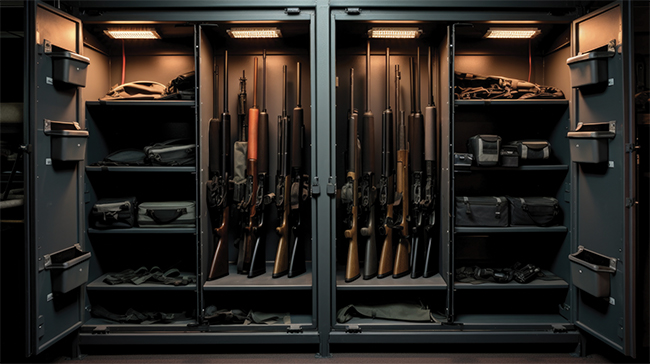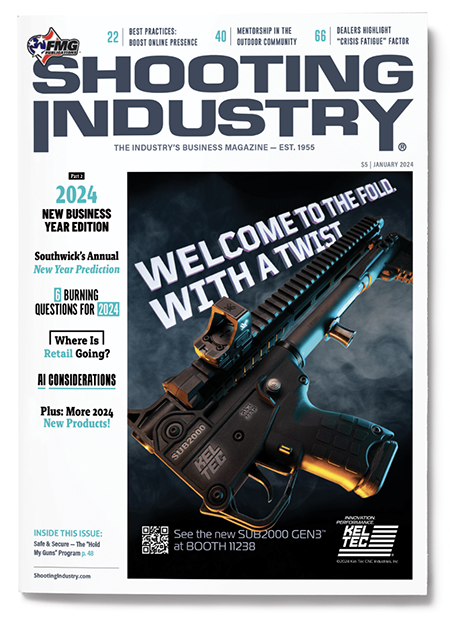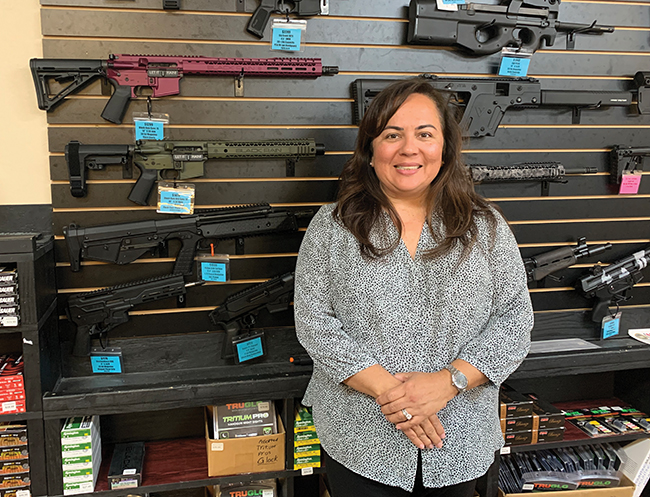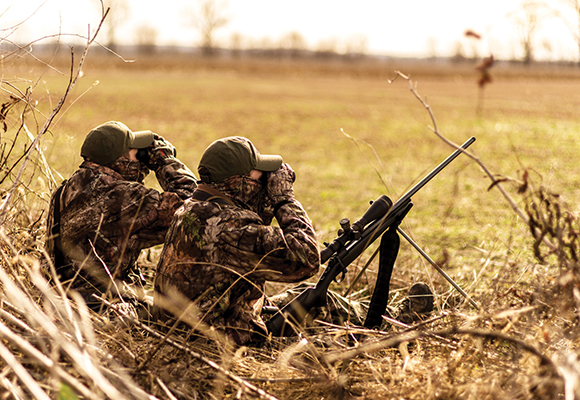Safe & Secure
A Trusted Resource For Firearms Owners
A customer in the midst of a complicated move, a divorce, a legal proceeding or even a life crisis might need a safe place to store his or her guns for a while. Some dealers already do that.
At the Gun Rights Policy Conference (co-hosted by the Second Amendment Foundation and Citizens Committee for the Right to Keep and Bear Arms) in Phoenix last September, I ran into the folks from Hold My Guns — a national program for FFLs to facilitate such a process.
Here in a Q&A format, Hold My Guns Founder and Executive Director Sarah Albrecht shares some insights about the program, and what it offers to our readers.
SI: What is the liability situation for a Hold My Guns FFL dealer if he returns a firearm to a person who had suicidal ideation, appears to be over it, but later kills himself with the gun the dealer returned?
SA: Our legal counsel, Joshua Prince, Esq., (SAF Executive Director Adam Kraut used to work at his firm) went to great lengths to create a customer-facing contract that protects the customer, FFL partner and Hold My Guns (HMG) nonprofit. It includes hold-harmless wording and the customer attests they’re using the storage for lawful purposes.
Additionally, the storage service is compliant with federal, state and local laws pertaining to the transfer of firearms (custodial storage mimics a consignment return process), which includes an ATF 4473 (aka Firearms Transaction Record), where the gun owner is attesting they’re transferring for lawful purposes, and are not prohibited. Passing a background check is required.
HMG Storage Partners do not ask why firearms are being stored; for all the FFL knows, the customer is going on vacation — which is one of several reasons why gun owners store firearms. HMG partners must carry liability insurance and add HMG as additional insured. Not asking why, attesting in the contract, waiver language in the contract, filling out a federal form attesting again and passing a background check all help to reduce liability. Please know we have not encountered being sued for this purpose, so it is impossible to say the full scope of liability.
HMG partners are also able to store non-serialized critical parts and accessories, such as a barrel, firing pin, upper or accessory like a key to a gun lock. Background checks are not required by law for these items, but the customer does still fill out the storage contract.
Although I founded HMG in the aftermath of a young friend’s suicide, customers store firearms for many reasons including deployment, the sale of a home, when someone is going into a homeless or domestic violence shelter, when there is a foster child in the home, when there is a prohibited person in the home, during the sale of a home (versus having firearms in a moving truck or hotel room), when someone has an extended hospital stay, when a family member dies and the firearms need to be stored during estate settlement, when someone in the home is struggling with addiction, etc.
It is also important to note in the context of liability, many times it’s not the gun owner who is struggling. They’re practicing self-governance to remove firearms from the home to prevent someone else in the home from having access.
Additionally, Washington and Louisiana have firearms storage liability protection laws for safekeeping purposes. There is definitely chatter of more states adopting similar legislation. I recommend any such legislation doesn’t not pigeonhole the reasoning as “suicide prevention” but instead recognizes people utilize firearms storage for many reasons. We do not want to assume the gun owner is in crisis, but we want to ensure this service is available to promote personal responsibility in general.
For more info, see https://app.leg.wa.gov/RCW/default.aspx?cite=9.41.380&pdf=true (Washington); https://www.legis.la.gov/Legis/ViewDocument.aspx?d=1289513 (Louisiana).
SI: Do we correctly assume that liability if the gun being held is stolen would be the same as if the stolen gun had been left with the dealer for repair or consignment sale?
SA: To clarify: I believe a stolen gun left with a dealer for repair (gunsmithing) is going back to the owner and it is typically (although state laws can vary) not checked to see if it is stolen. (In fact, for gunsmithing, if the firearm is returned the same day, it isn’t required to be recorded in the A&D book).
In a consignment sale, however, the FFL is facilitating the transfer of a firearm from the owner to a new owner, and it is common practice for the firearm to be checked before a sale.
The customer-signed contract (accompanied by required ID) attests they are the owner, and are lawfully using the service. The customer-facing contract has a place for remarks about the firearm that include a description and any special features or damage. (Just like if one were to rent a car, it is wise to inspect the car and note prior damage before agreeing to drive it.) This helps reduce liability to the FFL. The customer is aware this information is being recorded in the contract — they’re signing off on it.
Firearms in custodial storage are entered into the A&D logbook. Only minimal information is recorded in the bound book: make, model, serial number and owner’s contact information. (The nature of the recorded information is disclosed to the customer.)
The proper answer our FFL partners should give if someone comes in asking about a stolen firearm suspected to be in the books is: “We do not share information about our customers. Pound sand. You will need to come back with a court order.”
If the state mandates “lost/stolen reporting laws” or if the FFL operates as a Type 2 (pawn shop) and a “pawn check” for stolen firearms is required by law, it’s clearly stated in the FFL’s customer contract to ensure compliance with state and federal laws. Also, if a customer chooses to consign their firearm or transfer it to a separate household, non-prohibited third party (Read: not a straw purchase), the FFL may verify the firearm is not stolen before transferring it to a new owner — this is explained to the customer prior and it is to protect the liability of the gun shop from selling/transferring a stolen firearm to a new owner. An A&D logbook can only be viewed for investigation with a specific court order. FFLs care about protecting the privacy of their customers, and, built into the contract is wording that any information lawfully obtained in a court order will be requested to be sealed.
SI: Are there recommended fees for storing guns and if so, what would the recommended fees be?
SA: HMG recommends our FFL partners charge low-cost storage fees. Some of our partners charge a storage fee, plus a small fee for each additional firearm. For example, $10 per month, plus $5 for each additional firearm.
This helps to establish a legal contract with the customer and prevent customers from ditching firearms at the FFL. Nonpayment of monthly (or agreed upon interval — some customers who are going to be away for an extended period, such as a deployment or extended trip, may make other arrangements) fee creates an occasion for the FFL to contact the customer and ask about intent to continue storing the firearms.
There are some donors who have offered to help with scholarship fees, if needed. In the event of nonpayment, the customer can ask for a scholarship in some cases. This helps the FFL to have open communication and know the customer’s intent while having the fee covered.
It’s important to note FFLs do not ask a person why a firearm is being stored, and having a set fee regardless of circumstance (vs. free storage if a person says they are in crisis) supports privacy. It would be a breach of privacy to ask someone if they were in crisis for the sake of determining free/discounted storage.
SI: Do you know what have been the longest and the shortest “holds?”
SA: I’m aware of a short-term storage of a week for a residential move and a year-long agreement for someone who was away for a long-term work contract. The contract is written for a month but can be adjusted to meet the customer’s needs. In the case where state laws require a waiting period, the minimum hold for a firearm would have to be in compliance.





